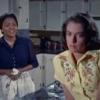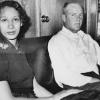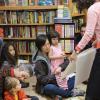"I think for a lot of people, being black, and even being a man can be very difficult. But I chose not to have that as an issue. And I think that I’ve survived life better by not allowing that to be an issue. I don’t want to be bitter, and I don’t want to be angry."
Themes: Parents & Children
Caroline Fermin
“When we did the census a few times, she would be on the phone with them and they’d be like, 'Well, whatever language you speak at home is what race you are.' My mom would be furious. Having to choose I felt like was the hardest part."
Jasmine Mitchell
"I was already dating my husband, and my friend kept on trying to set me up with this guy. He's actually a very nice guy. He'd be great for someone else. But what she kept on talking about, “He's also biracial, Jasmine. He's also black and he's also white. You guys should date.” I was like, “I already am seeing someone.” She's like, “But I think you guys are really good.” It was like that was the key."
June Kaplan
"My father was one of 12, only four of whom actually came through the war. The rest were either killed in Germany — I don’t know how many of them were interned in camps. There’s a hole in the knowledge that we have about the Feigenheimer side of the family. And one of the things I’m going to do when I’m retired is go back and patch together what happened to the other 11 brothers and sisters."
Lyn Hill
"We kind of went for the high holidays and for the other holidays as well, for Sukkoth and Simchat Torah and Hanukkah and then my parents very often went on Friday nights and I did go through a period when I was maybe 13, 14, 15 years where I actually went every Saturday morning by myself...And then I went less often until -- maybe mostly just for high holidays until I got married at which time nobody from Habonim would marry us because I was marrying a non-Jew and for many, many years that w
Paul and Yurika Golin
"Right before my bar mitzvah, when I was hating the studying, I was 12, and I already knew that I was, at the least, agnostic -- I kind of yelled at her, “I don’t want to do this. I don’t believe in God.” And she said, “Well, I don’t either, and you’re going to do it.” And it was really interesting to me because at that point and for the rest of her career she had already dedicated herself to working as a Jewish communal professional in the Jewish Community Centers movement.
Svetlana Kitto
"So on one hand like I grew up being told that the Russians saved my grandfather’s life, because they did, but on the other hand like he’s Latvian, so -- my grandparents just had this very sort of mixed thing. Because on one hand they were Jewish, but on the other hand they were Latvian, and so they had Jewish allegiances and then they also grew up in Latvia and loved their country."
Janise Mitchell
"Around the late 60s and 70s all of the sudden you see a lot of “for sale” signs. And this was the period of “white flight.” Families that I knew all of the sudden, oh, you guys are moving? It really shattered a sense of security. I thought that we were all friends, but perhaps that was just from my lens. Maybe that’s what I was hoping but the reality — there was some underlying intention that I did not allow myself to become aware of."
Taneka Maxwell
"We came to Brownsville, Brooklyn. My great grandmother owned a brownstone out there. Her name was Lillian but everyone called her Nanny. She was the matriarch of the family, well known throughout the neighborhood and the house was definitely multigenerational and just different family relationships. We had aunts and uncles and cousins living in a three story brownstone."
Monica Elias and Roy Walter
"This particular synagogue condones the questioning, and condones the ambivalence, and says that blind faith is not what it’s about. This is what makes this a vibrant community, that we are always asking questions, and we have different opinions. It’s got to be a living religion. It can’t be resting on the liturgy that is really old, and may not be applicable to this community."
Fiona Gardner and Uche Nduka
"People look at us as if we dropped in from the clouds, even at this phase of human history. I didn’t know that we can still have that kind of reaction, even within New York. It’s not like people voice it out in terms of antagonistic confrontation, but they can still see it in the eyes. The surprise -- “Oh, how do they manage?” You know: “how did that happen?” And all that."
Ericka Basile
"...So for someone in Tennessee to just say, “Oh, you’re black,” you know, I am. But to me -- living there, when someone says that, it’s almost like -- not a dismissive thing, but it’s like they’re not doing the extra work to understand what other things comprise you."
Corbin Laedlein
"At some point in high school, I started to feel some real internalized racism because there was this feeling, like, textbooks are only talking about people who look like my dad. You open a textbook and it shows no contributions to human history of people from who descended from Africa or indigenous people from the Americas..."








